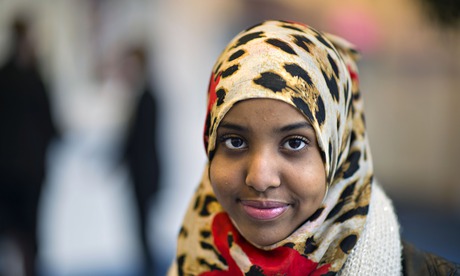
It has been deeply inspiring for me to hear that Fahma Mohamed, a 17-year-old supported by the Guardian, has attracted well over 212,000 signatures to her petition demanding action to end female genital mutilation (FGM). I applaud her desire to enlist headteachers and reach every girl at risk of FGM, for this is also a British and European problem, with thousands of girls still being taken abroad to be cut. Headteachers, and governments, have a vital role to play in helping to convince families not to send their daughters abroad and help those girls – some 24,000 in the UK alone – thought to be at risk. The decision of the Scottish government to write to every headteacher asking them to train staff and educate parents is a major step forward.
As UN secretary general, one of my priorities is to help to empower women and girls, by promoting their health and defending their rights. We should strive to preserve the best in any culture, and leave those that harm behind. I hope that Fahma's campaign is taken up elsewhere in the world.
There is no developmental, religious or health reason to cut or mutilate any girl or woman. Although some would argue that this is a "tradition", we must recall that slavery, so-called "honour" killings and other inhumane practices have been defended with the same weak argument. Just because a harmful practice has long existed does not justify its continuation. All "traditions" that demean, dehumanise and injure are human rights violations that must be opposed until they are ended. FGM causes grave harm to individuals. The health consequences include depression, insecurity, pain, infections, incontinence and deadly complications in pregnancy and childbirth. Mothers shouldn't be terrified of giving birth to daughters.
The practice is declining in almost all countries, but it is still frighteningly widespread. Although firm statistics are difficult to obtain, it is estimated that more than 125 million girls and women alive today have been cut in the 29 countries in Africa and the Middle East, where FGM is most prevalent. If trends continue, a further 86 million young girls worldwide are likely to experience some form of the practice by 2030. Asia, Europe, North America and other regions are not spared and must be equally vigilant in addressing the problem. An estimated 60,000 women and girls have been victims in the United Kingdom alone.
Fortunately there are positive signs of progress in our global push to end this harmful practice. Girls themselves instinctively understand the dangers of being cut, and many mothers who have seen or experienced the trauma want to shield their daughters from suffering. It is encouraging that an increasing number of communities are agreeing publicly to end FGM and ensure a better life for their girls.
Recently, Uganda, Kenya and Guinea-Bissau adopted laws to end FGM. In Ethiopia, those responsible have been arrested, tried and penalised, with full media coverage further raising public awareness.
The UN and our partners are engaged in valuable, culturally sensitive activities that aim to stop FGM without scolding or shame. In Sudan we are seeing social change from a campaign called Saleema, the Arabic word that implies complete, intact, whole and untouched. One father, who was moved by the effort and decided to leave his daughters uncut, explained simply: "A girl is born saleema, so leave her saleema." Hundreds of communities have embraced this initiative, expressing their support through songs, poetry and clothes in the campaign's trademark bright colours. Other countries are emulating the Saleema campaign, or coming up with solutions tailored to their local needs: in Kenya, for example, Meru community elders have prohibited FGM and vowed to impose a fine on anyone who conducts or abets the practice.
In addition to prevention, the UN is working with partners to help those who have been affected by FGM. Pioneering medical advances now allow doctors to repair women's bodies and restore their health. I recall the words of one physician in Burkina Faso who described "the relief that overwhelms women" following the surgery, which she said is 100% effective. The many women who lack the resources they need to travel to get access to the right facilities and the programmes that offer proper treatment deserve generous support.
The general assembly's landmark resolution proclaiming our recent International Day of Zero Tolerance for FGM was sponsored by every country in Africa and embraced by the entire membership of the UN. This breakthrough shows the great value of the UN in rising as one to defend universal human rights. The effect on individuals will be profound, sparing them terrible suffering and pain. So thank you, Fahma, for what you are doing to help make this happen.

